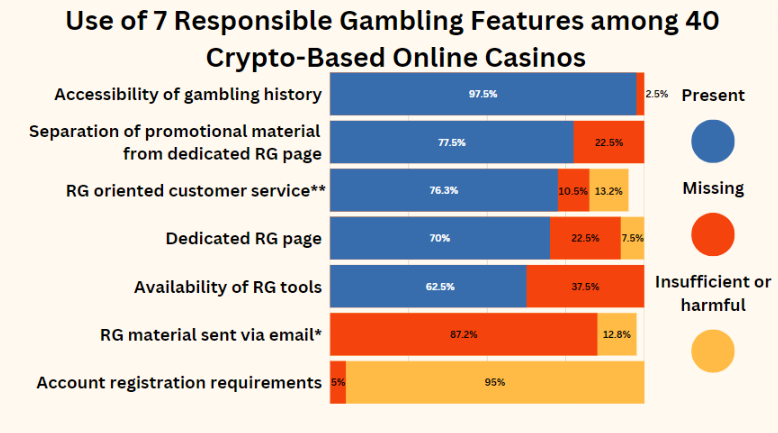Many countries, such as the United Kingdom (UK), have created powerful regulatory bodies which are meant to protect consumers and mitigate risks that come with gambling. These regulatory bodies are not perfect, however. They can be slow to adapt to changes in the gambling landscape such as the rise of online gambling. Further complicating these issues is the presence of cryptocurrency-based1 online gambling operators. While online gambling carries its own risks, crypto gambling might be especially risky for consumers due to the lack of regulatory oversight. Research on the association between crypto-trading and gambling problems also suggests that individuals who engage crypto-gambling may be especially at-risk for gambling problems. This week, The WAGER reviews a study by Maira Andrade and colleagues that reviewed the responsible gambling (RG) features offered by crypto-based online gambling operators.
What was the research question?
What kinds of RG features do cryptocurrency-based online casinos employ?
What did the researchers do?
The researchers collected data from 40 cryptocurrency-based online casinos that were accessible from the UK. Of these, 22 were accessible directly from within the UK, while 18 required a VPN connection to access. The researchers then searched for the presence of seven features intended to promote RG on each of these sites. These included: (1) thorough account registration requirements, (2) a dedicated RG page, (3) separation of promotional material from the RG page, (4) availability of RG tools, such as deposit limits, (5) accessibility of gambling history, (6) RG material promoted via email, and (7) having RG-oriented customer service. (The researchers coded other crypto-based features, but we are not reviewing them here.)
What did they find?
The majority of operators required only minimal information to register. Fourteen sites required an email address (or less), and none required proof of age. The presence of responsible gambling material was also limited; though 31 out of the 40 sites offered an RG page, many contained either promotional material, suggested that gambling was a way to make money, or were otherwise insufficient in educating consumers about gambling-related harms. Slightly over half of the sample (62.5%) provided at least one RG tool, though these were also often limited or not user friendly. Notably, however, 39 of the websites offered gamblers access to their gambling history. Email communication was especially problematic among these sites. Only five sent emails containing RG information, and an additional five either didn’t respond or sent potentially harmful information after a hypothetical request for help from a consumer2 (see Figure).

Figure: Number of crypto-based online casinos with each of the seven RG features.
*One operator was not rated because they did not require an email at registration.
**Two operators were not rated on this criteria.
Why do these findings matter?
These findings could help regulators, researchers, and policymakers understand the current landscape of crypto-based gambling. For example, it’s possible that youth might be engaging with these sites, leading to potential current and future gambling-harm. Other findings suggest that these operators’ RG practices often involve harmful or incorrect information regarding gambling safety, which might increase gambling-related harm instead of reducing or preventing it.
Every study has limitations. What are the limitations in this study?
The researchers did not make deposits or otherwise gamble on any of the crypto-based gambling sites, so they did not get the full customer experience. As such, it is possible that the researchers missed some of the sites’ features or that their records of the sites’ features contain inaccuracies. For example, though the study found that 39 sites offered access to an accounts gambling history, it is unknown whether these were accurate reports or how frequently they were updated. Additionally, despite reviewing 40 sites, this sample is relatively small compared to the overall number of crypto-based gambling sites.
For more information:
Individuals who are concerned about their gambling may find support through the National Council on Problem Gambling or with Gamblers Anonymous. Additional resources can be found at the BASIS Addiction Resources page.
—John Slabczynski
What do you think? Please use the comment link below to provide feedback on this article.
________________
1. Cryptocurrency refers to a digital asset that is worth money and can be used to buy goods and services. The most popular and well-known type of cryptocurrency is Bitcoin, which was released publicly in 2009.
2. To examine potential responses to someone experiencing gambling problems, the researchers sent requests to all 40 websites with the following text: “I want to control my gambling. Can you give me any information on how I can do that? I feel a bit addicted and sometimes I can’t control the money I’m spending.”




